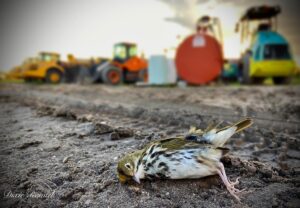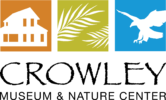Phone: 941-322-1000 | Email: [email protected]
Wildlife Wednesday Ovenbird and Conservation
Wildlife Wednesday Ovenbird and Conservation
Today’s installment of Wildlife Wednesday is a bit different than others. Today I present to you, with sorrow, an ovenbird (Seiurus aurocapilla).

This individual is deceased due entirely to human development of natural land and habitat. I saw this happen. This small warm ball of fluff, at maximum, 6” long and 1oz in weight, was no match for the vehicle that hit as it. It was flitting around an area that, less than a year ago, was forrest bordering open field. A tiny creature like this often goes unseen in life and death unless you’re looking for it. But this doesn’t devalue the individual life of this little songbird. Being very small and fragile is perilous enough in the natural world. Now, add the difficulties the human world is creating by thoughtlessly devouring natural spaces for our own unnatural use and greed. The common name, “ovenbird” refers to the nesting habits of the species. They are ground nesters, building a humped nest with a side entrance similar to the structure of a clay or pizza oven. Tiny parents and ground nesting already make the task of survival more difficult for offspring than it is for tree or cavity nesting birds. They are at much greater risk of predation and several other perils. So you see, this little bird with a big voice survived a difficult and doubtful start as an egg, nestling, fledgling and adult. It survived to full adulthood only to be struck and killed by something wholly unnatural. But it’s just a little bird that I said goes unnoticed, right? A little insect forager in remote Myakka.
Does it really matter? Think about it.
The first panther killed, those killed in obscurity, no big deal right? Well, what about now? The first gopher tortoise buried under a concrete pad to suffer long before an agonizing death…The first sea turtle caught in a net, the last indigo snake you’ve seen, does it matter yet? If not, when does it? Development can not and will not be stopped, degradation of natural habitat and death will occur.
We can’t simply say “close the gates! But only after me.” What can we do?
We can certainly conserve more if not all of the natural land left. We can impress upon multimillion and multibillion dollar companies and developers in Florida to do better, to do more. To invest some of their gratuitous earnings in offsetting their negative impacts. To conserve, plant native, plan for the impacts on wildlife and watersheds more than they do now. Better than they do now.
We can do our own parts too. We, as humans, as the self professed smartest of the animals, can and should do better. How will you?
